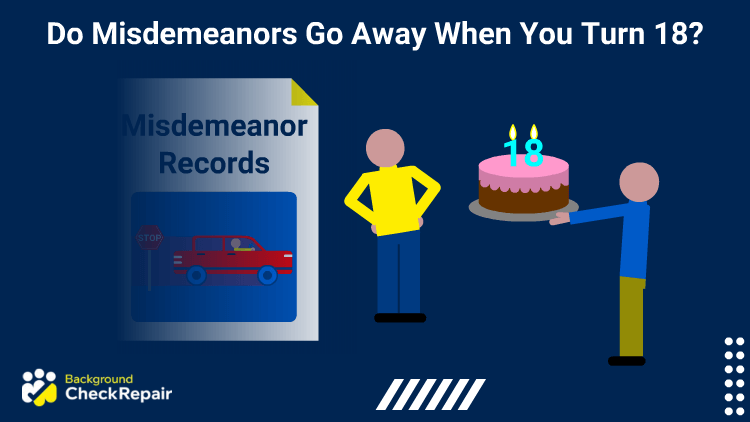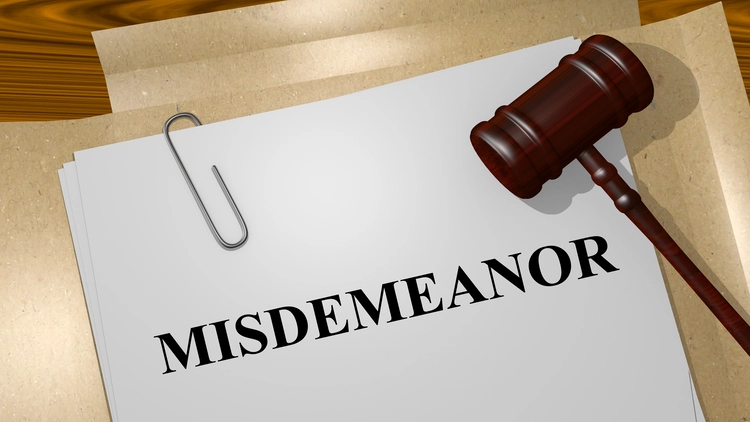Can a Juvenile Record Keep You From Getting a Gun?
Yes, individuals convicted of a felony will be disqualified from gun ownership, regardless of the age of the individual when the crime was committed.
 Written by Background Check Repair
Written by Background Check Repair
Background Checks | June 19, 2024

Table of Contents
Do misdemeanors go away when you turn 18? Many individuals who were convicted of a crime while under the age of 18 wonder if their juvenile record is automatically cleared once they reach adulthood.And if not, how to remove it?
But, the answer isn’t always a one-size-fits-all solution. Not only does every state have its own process for sealing juvenile records, but discovering the method to use for a search into juvenile criminal records and finding out if juvenile records may be used against you are all different.
Generally, juvenile records will not be automatically sealed when the individual turns 18.
Although the method for how to remove a misdemeanor from your record, the process is fairly simple in most states.
The following guide explains the answers to the questions, how long will misdemeanors stay on your criminal file and how do I know if there is an existing misdemeanor in my history.
In fact, anyone can find out immediately if a juvenile misdemeanor will show up on a background check by doing a name-based search right now.
Wondering, do felonies remain after reaching 18 years of age is another common question. There are a substantial amount of misconceptions regarding what happens to juvenile records when an individual turns 18. Many people will have heard that an individual’s entire record will automatically disappear when they turn 18, or at the very least, misdemeanors will disappear from their record.
Unfortunately, this is almost never the case.
When a juvenile with a criminal record turns 18, their criminal record will almost always remain intact, regardless of the nature of the crimes or if the crimes were misdemeanors opposed to felonies. However, in most cases there are plenty of options for these individuals to get the records sealed.
One of the common misconceptions around juvenile records is what it means when the record “disappears.” A criminal record will almost never truly disappear, most likely when someone refers to a record disappearing they are referring to a specific record being sealed. When a record is sealed, the record of the crime including arrest information, charges, and conviction related information will essentially be invisible to the public.
Whilst most criminal records are public, which means anyone is free to access the records at any time for any reason, when a record is sealed it will no longer be available to the public. In this case, an individual requesting one of these records at the courthouse will be denied access to the record.

However this does not mean the record no longer exists, only that the public can not access it. Law enforcement and other government agencies will still be able to access the records as normally and they will be considered relevant information should the individual have any further trouble with law enforcement such as another arrest.
Another possibility is a record getting expunged. Although getting records sealed is a fairly uncommon practice, getting a record expunged is even less common. An expunged record amounts to essentially destroying the record. In this case the record will truly disappear and only certain law enforcement agencies will have access to the records.
This is often reserved for extreme cases such as evidence exonerating an individual after they have been convicted of a crime.
Many individuals wondering do misdemeanors go away when you turn 18, will have heard that misdemeanors will automatically disappear from your record after a certain amount of years. However, this is rarely the case and most misdemeanors records will remain on a person’s individual record forever, but ONLY when searched by law enforcement.
For example, a misdemeanor will not be visible for employment or other non-law-enforcement related searches, but will show up (regardless of how old it is) when police, the Department of Justice, or some other federal agency searches.
Although it is a fairly easy process in most cases for a juvenile to seal any records when they turn 18, adult misdemeanors are a different story. Although some states will automatically clear records after 7-10 years, the vast majority of states will keep misdemeanor records forever.

Another possibility is states, such as California which allow certain kinds of misdemeanors,1 such as drug charges to be sealed from the public (like for employment) after a few years. However, these laws and situations are fairly rare.
The regulations set by the FCRA are the only federal background check laws and cannot override state processes.3 Currently there is no limit for how far back a background check can go under the FCRA.
The idea of a criminal record clearing after 7 years is a common misconception. Some states have adopted what is known as the 7-year-rule, and many people wonder, do felonies go away after 7 years? This makes it illegal for background check agencies to report criminal records that are older than 7 years old. These laws are intended to help individuals with criminal records more easily find employment after a certain amount of time has elapsed.
However, that doesn’t mean the crimes no longer show up when law enforcement or other agencies check.
There are only a handful of 7-year states which are as follows. Every other state will keep criminal history information indefinitely
Similar to the misconception about criminal records being cleared after 7 years, many individuals will instead have heard that this occurs after 10 years. This unfortunately is a misconception that likely stems from the 7-year-rule states.
Many of these states will clear criminal history information after 7 years unless the individual meets certain criteria such as their income level, in which case a background check can return information up to 10 years old instead of seven.
However, as always, an adult criminal record is never fully erased, it just gets limited to who can see it.
Juvenile records are rarely sealed automatically when the individual turns 18. However, as opposed to adult crimes, getting a juvenile record sealed is far easier in most cases. Most states will have specific steps that can be followed to allow for juvenile records to be sealed when the individual turns 18.

Although the individual must petition with the courts for the record to be sealed, most states have special laws for this situation to both speed up the process and make it fairly easy to get the record sealed.
Individuals with juvenile criminal records should have a fairly easy time getting the records sealed for the most part. However, this does not happen automatically at 18 or at 21. In fact, many states will have a time limit for when these records can easily get sealed, usually within a certain amount of time after the individual turns 18.
In these states, if the individual waits until they are 21 to begin the process they may be too late.
Most of people asking questions like, do misdemeanors go away when you turn 18, really wonder, will a misdemeanor appear in an employment background check and will it affect your chances of securing a job?
Getting a background check can be a somewhat nerve-wracking process for individuals who have criminal records. Luckily, more employers than ever are making an effort to hire individuals with criminal records. Those with low-level misdemeanors will have a fairly good chance of passing a background check.
The odds of passing a background check with a misdemeanor will depend on a few factors:
The policy of the employer will be the hardest to overcome. Although rare, some companies will have policies that prohibit anyone with a criminal record of any kind from being hired. This may be a matter of company policy or may also be required by law due to the industry the job is in.
The job duties will also be a major factor. Mainly, the way the crime relates to the job duty. Most employers perform background checks to limit liability. For example, most employers will see it as too big of a risk to hire an individual with a history of drunk driving to drive a company car. The same is true for jobs with valuable merchandise and individuals with theft convictions.
The crime itself is likely the biggest factor in most cases. Many jobs will simply not hire individuals who have been convicted of certain crimes. Most notably, sex crimes, crimes involving children, and most violent convictions will be fairly hard to overlook for most employers.
Finally, the individual’s attitude toward their criminal record will play a major role. Even if the conviction was fairly serious, many employers will choose to overlook an applicant’s history if the applicant has been working to reform. Proving this will be up to the applicant, but having a prepared response that demonstrates the steps the applicant has taken to move forward from their criminal past will go a long way.
Although when it comes to, do misdemeanors go away when you turn 18, there are options to get the record sealed, but there are not the same opportunities when it comes to a driving record.
Many jobs will require that individuals have a clean driving record in order to be eligible for hire. This is especially common with jobs where driving a company car is part of the primary job duties such as Amazon drivers, Uber drivers, and UPS drivers.
Driving records will not clear when the individual turns 18. Unfortunately, there is almost no way to get a driving record cleared besides waiting the standard 10 years for the record to be automatically cleared. However, keep in mind that not all jobs that involve driving will require a completely spotless record.

Many of these jobs will be looking for major red flags to determine how much of a liability the individual would be.
Individuals with minor infractions such as speeding or distracted driving tickets will generally have little to worry about for most delivery or other driving jobs. However, individuals with unusually high amount of these kinds of infractions or more serious things on their record such as misdemeanor-level driving offenses such as DUI or reckless driving will likely not pass the background check and will be disqualified.
The exact process for sealing juvenile records will vary from state to state, however, most states will make the process fairly easy in most cases. Although there will be exceptions for situations involving serious crimes or crimes where the juvenile was tried as an adult, the process will involve filing a petition with the court to have the records sealed.
This will be done through the same court that filed the initial charges and the process is usually fairly quick, due to how common this situation is.
Individuals can use the list below to find more information for their state.
Keep in mind that some states, such as Colorado,2 have laws that allow for juvenile delinquency records to be sealed automatically when the individual turns 18, so checking state laws is important for individuals trying to get a record sealed.
Although getting a record to go away is normally extremely difficult if not impossible, clearing a misdemeanor committed as a minor from a criminal record is by far the easiest record to get sealed. Keep in mind that these kinds of records will never truly go away, only block the public from accessing the records.
Although this doesn’t sound like it would make a huge difference it is actually a massive help, especially when it comes to pre-employment background checks. Almost all private employers will perform a background check on an applicant they are considering hiring, which will usually include a criminal history check of the individual.

To do this, the employer will usually hire a third-party company to perform the criminal history check.
There are tons of different background check companies that the employer may use but most of them will operate the same way. Using information provided by the applicant, specifically their name and Social Security Number the background check service will run the information through various databases. Most often these will be court databases and law enforcement databases in order to find charge and conviction information on the individual.
However, these private companies are generally only able to access public information during the check. This means that sealed records will not be present on most pre-employment background checks.
Furthermore, one of the reasons it is important to get a record sealed is because it allows individuals to legally claim they have never been convicted of a crime. Although this is technically untrue, and the record has simply been sealed, the law specifically allows individuals to make this claim on job applications.
There is one notable exception to a sealed record not appearing on a background check. As mentioned, sealed records only block the public from viewing records but law enforcement agencies will still be able to access the record. This means that background checks performed by government agencies such as FBI background checks or state background checks will show this information.
The most reliable way to see if you have a misdemeanor on your record is to perform a background check on yourself. This can be done in a few different ways, such as using the search bar at the top of this page to perform a free public records search.
Other options include hiring a private background check service to perform a check on you or performing a federal background check on yourself for the most thorough check possible.
Juvenile records can be used against you for employment. Employers are likely to use any records available to them to make a decision regarding a hire. This is the main reason it is so important to get any records sealed as soon as possible.
Juvenile records are not usually public. Generally, any records involving juveniles are sealed due to the individual’s age. However, it can be fairly easy to petition for access to the records for any legitimate reason.
Since most juvenile records are not public, they will not be accessible via any of the common criminal records searches such as those offered through state and local courts.
Getting a record sealed may seem like an intimidating process, but is absolutely worth it for most individuals. Keep in mind that when it comes to Do misdemeanors go away when you turn 18, although they can, the process is rarely automatic.
Yes, individuals convicted of a felony will be disqualified from gun ownership, regardless of the age of the individual when the crime was committed.
Performing a background check on yourself will be the best way to determine if a record is sealed. When performing the check, sealed records will not be present in the results.
States that automatically seal juvenile records in most cases are: Alaska, Florida, Arkansas, Maryland, California, New Hampshire, Illinois, South Carolina, Montana, Virginia, Nebraska, Nevada, New Mexico, North Dakota, and Texas.
Generally, only immediate family members such as legal guardians and the individual themselves will have access to juvenile records.
Misdemeanors will affect employment, but usually only minimally. However, there are numerous factors to consider such as the crime and job duties.
1California Legislative Information. (2022). SB-731 Criminal Records: Relief. Bill Information. Retrieved September 22, 2022, from <https://leginfo.legislature.ca.gov/faces/billStatusClient.xhtml?bill_id=202120220SB731>
2Colorado General Assembly. (2022). Juvenile Delinquency Record Expungement. Bills. Retrieved September 22, 2022, from <https://leg.colorado.gov/bills/hb16-1395>
3Federal Trade Commission. (2022). Fair Credit Reporting Act. United States Government. Retrieved September 22, 2022, from <https://www.ftc.gov/legal-library/browse/statutes/fair-credit-reporting-act>
We use cookies to ensure that we give you the best experience on our website. If you continue to use this site we will assume that you are happy with it